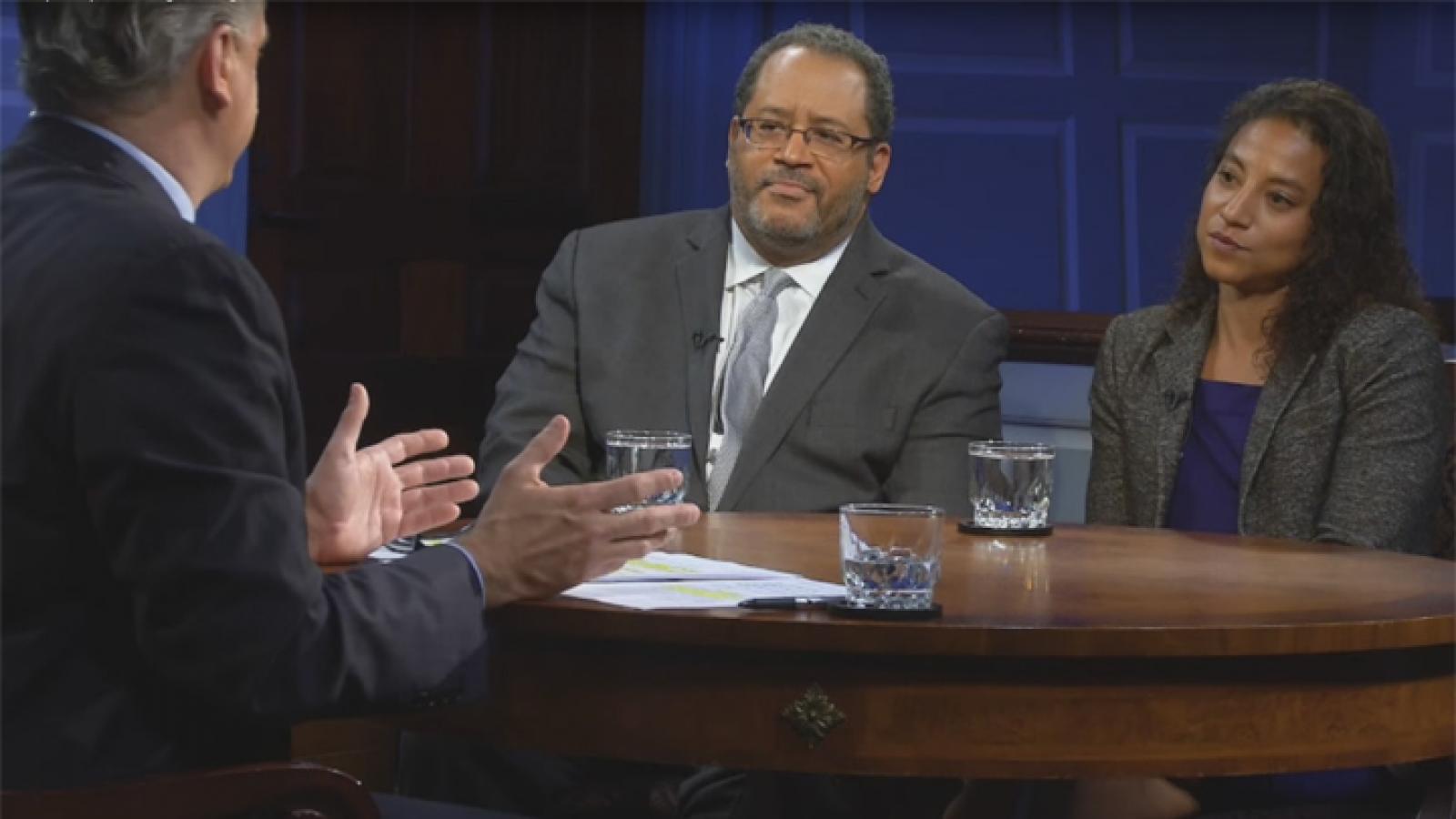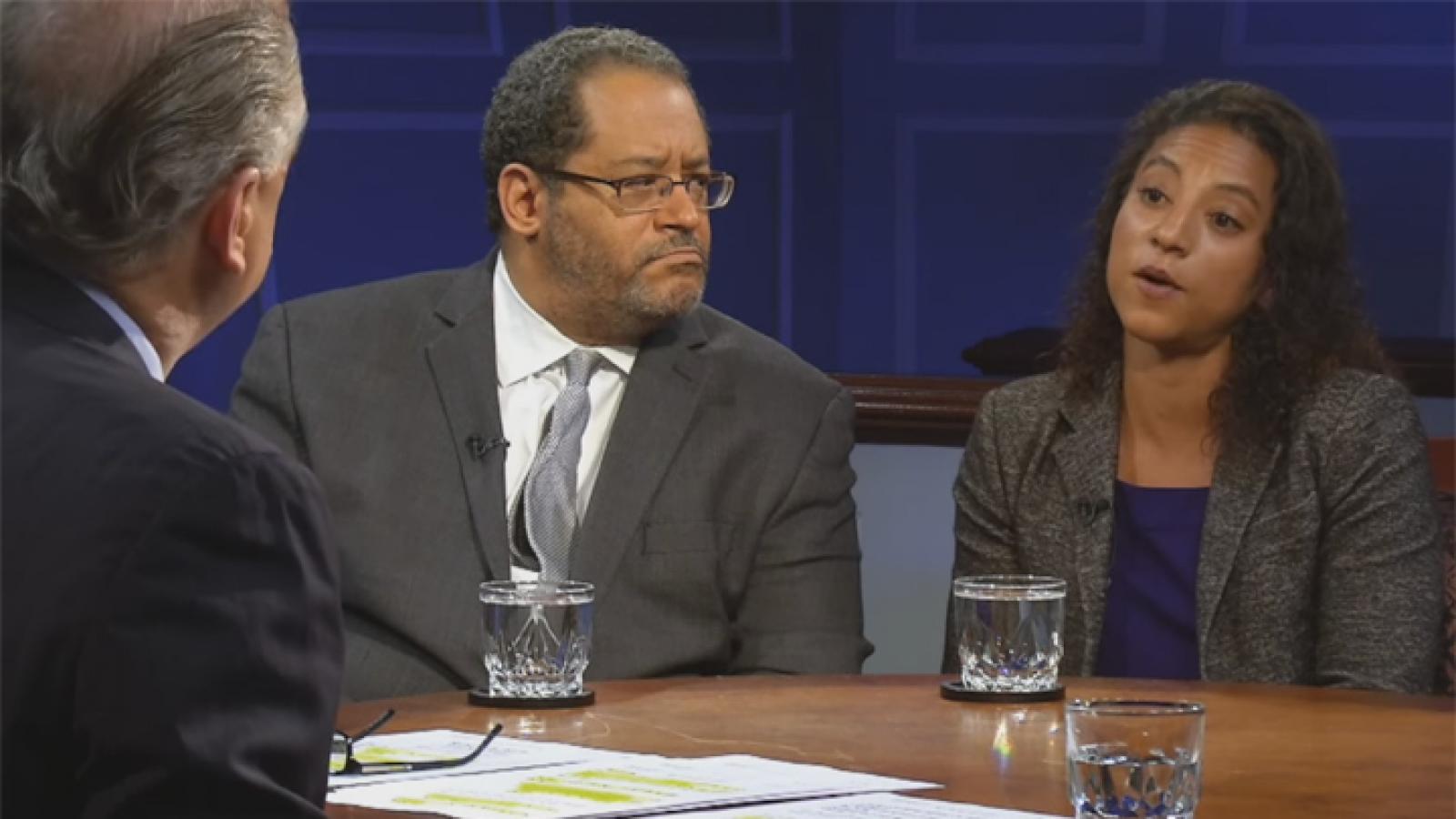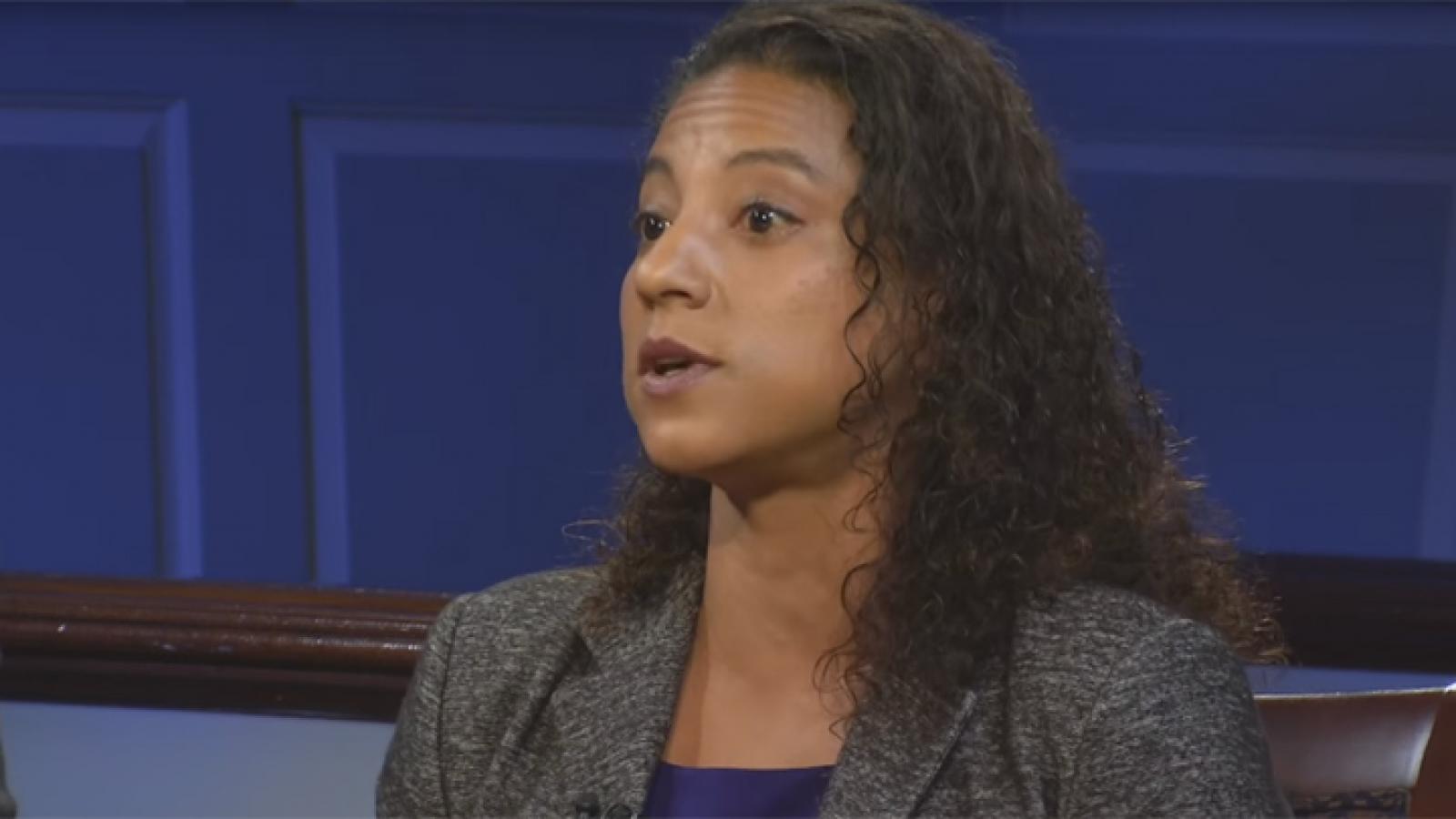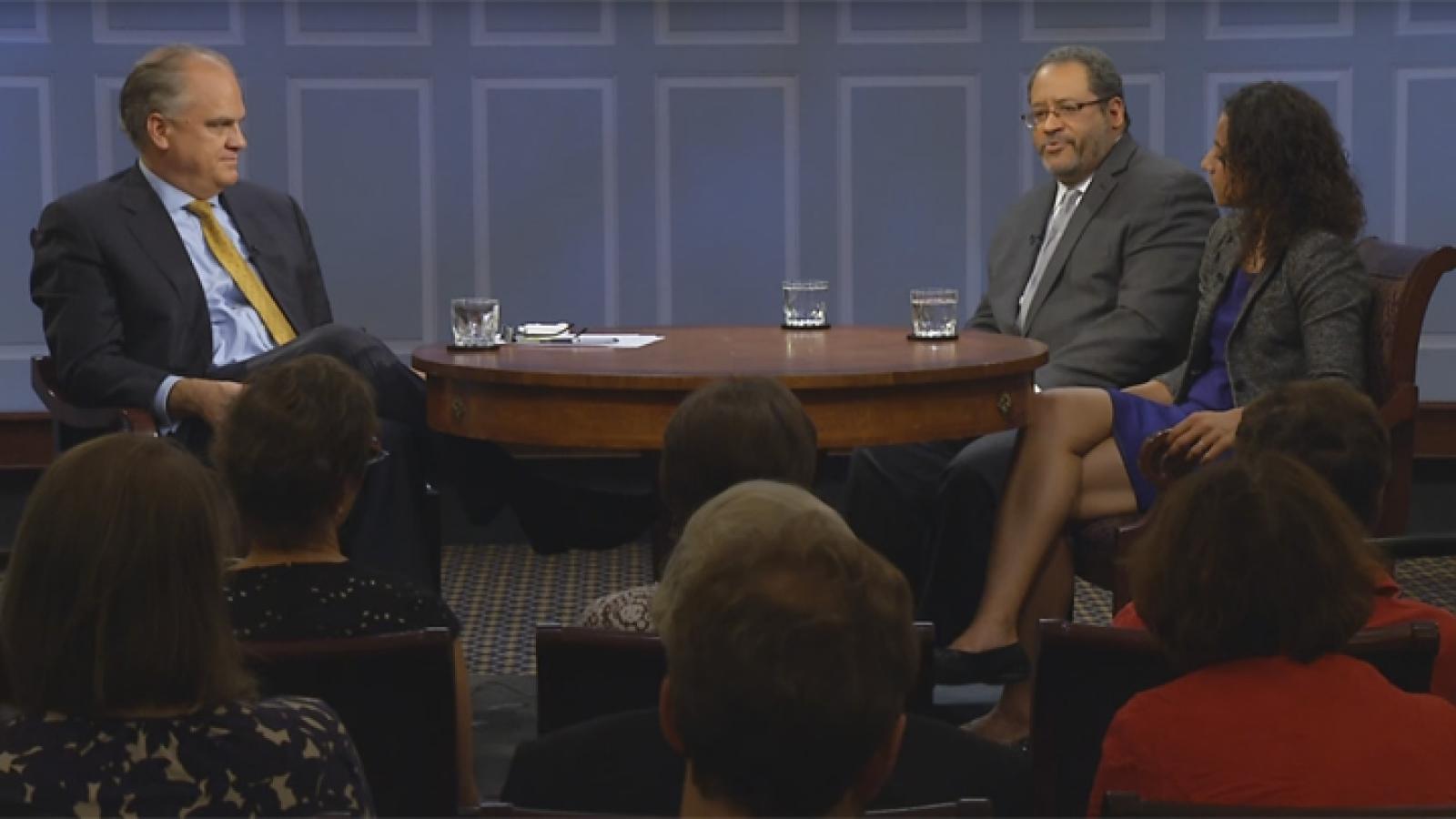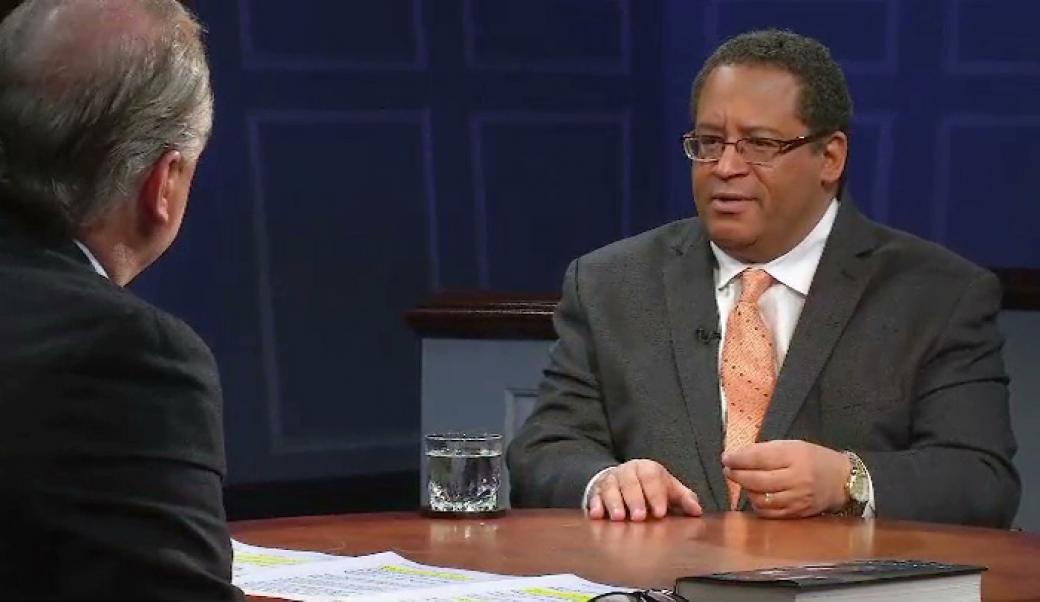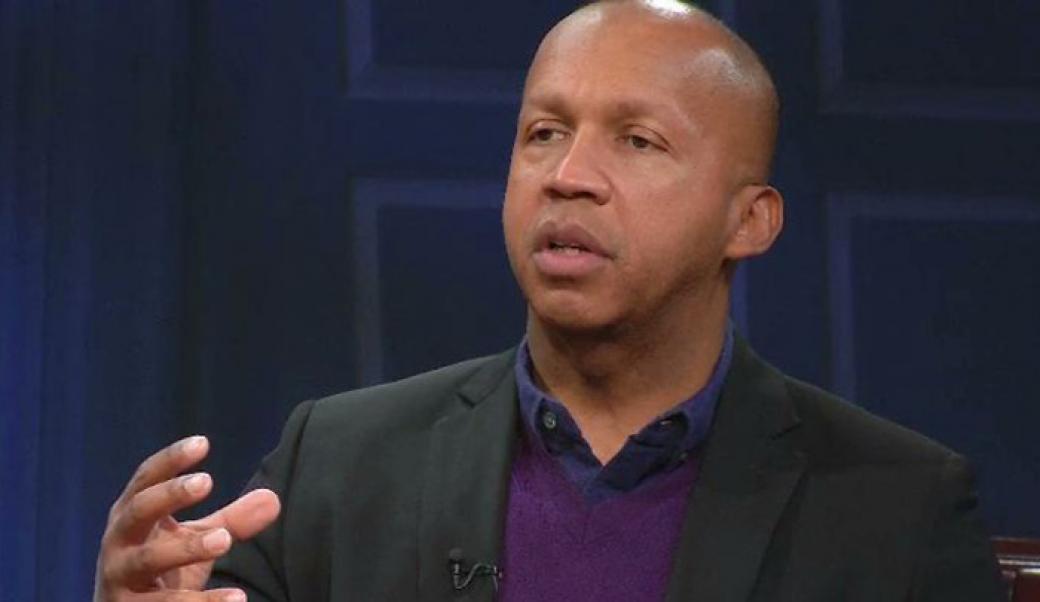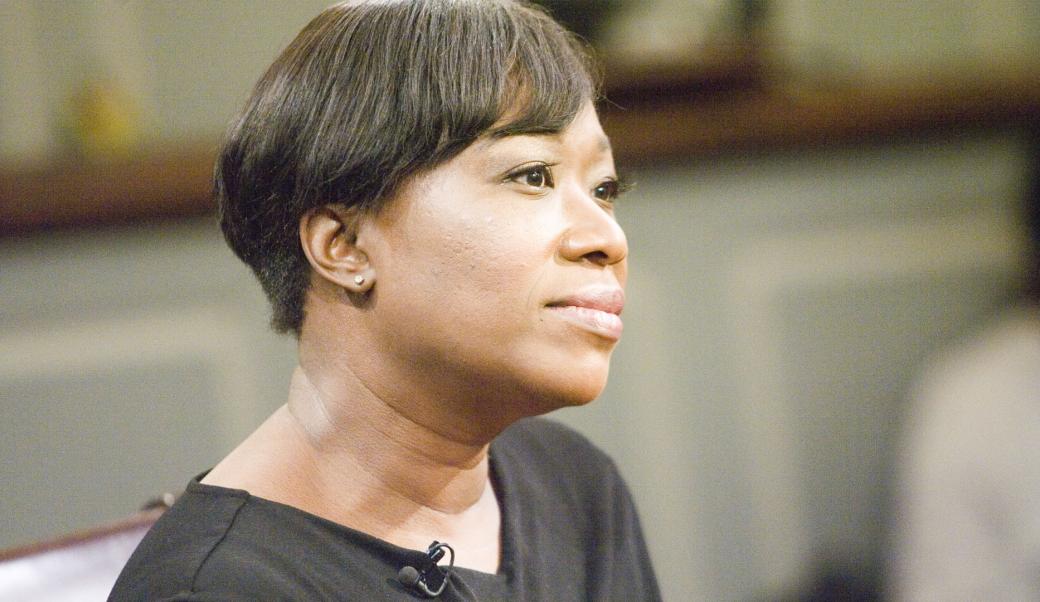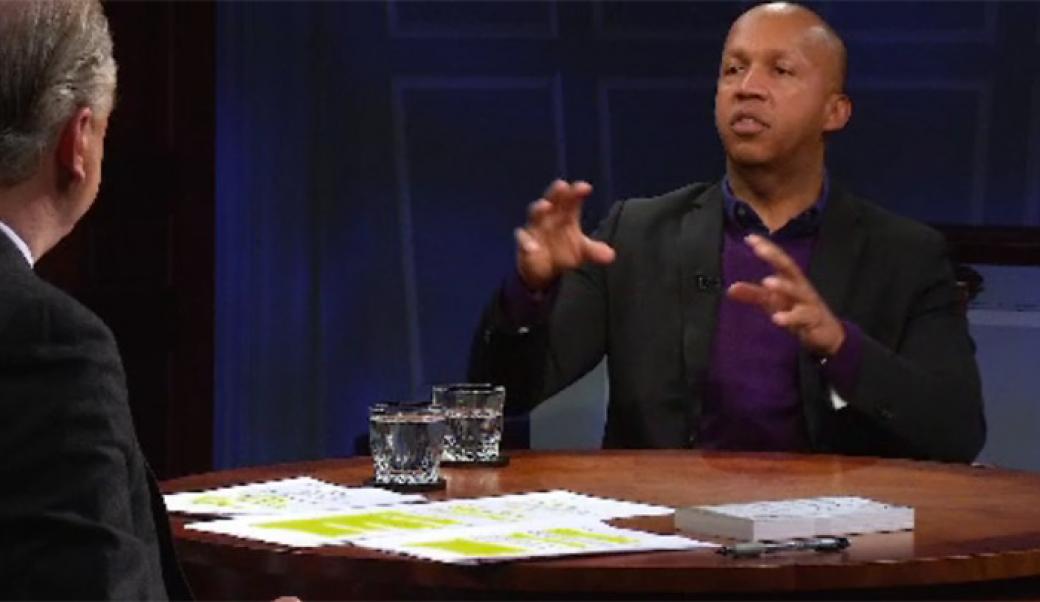About this episode
June 24, 2016
Michael Eric Dyson, Elizabeth Hinton
Michael Eric Dyson, a New York Times op-ed contributor, MSNBC political analyst, and a professor of sociology at Georgetown; and Elizabeth Hinton, an assistant professor in history and African American studies at Harvard, look at racial attitudes, the recent history of race relations, and racial violence in America.
Transcript
0:51 Doug Blackmon: Welcome Back to American Forum. I’m Doug Blackmon. As we begin the final six months of the presidency of Barack Obama the nation is grappling with both the enormous question of who will succeed him and what the nation’s agenda should be as of January 2017. There is a strong argument that in terms of the country’s central direction in the years ahead, this will be one of the most pivotal elections in generations. One of the most urgent questions almost certain to confront the new president during her or his First Year in office, will be an issue that often dominated national debate in recent years: Race in America. Police Violence toward minority citizens. Racial attitudes among white Americans. Whether overt racism remains strong in the country. Whether “structural racism” embedded in our schools, companies and other institutions is silently injuring millions of Americans largely unseen. As tension flared around these questions after the police shootings in Ferguson, Missouri, Baltimore and other cities, many Americans were bewildered that even after the landmark election of our first African American president and so many other signs of progress in the past five decades, the country remains a tinderbox. And neither our president or any other leaders seemed able to effectively address what was happening. To wrestle with these immense questions, as part of our ongoing examination of the biggest challenges facing our next national leader, the Miller Center asked a group of scholars representing a wide political and academic spectrum, to offer their recommendations to the next president for establishing a new and more effective approach to race. In this episode, we’ll discuss the ideas offered by two of them, both among our nation’s most brilliant and impassioned intellectuals. Michael Eric Dyson, a sociologist at Georgetown University and the author of many many books, has been an outspoken critic, and at times supporter, of President Obama’s performance in office. Earlier this year he published a new volume titled: The Black Presidency: Barack Obama and the Politics of Race in America. Also with us is Elizabeth Hinton, a professor of History and African and African-American Studies at Harvard. Her research examines how government programs initially aimed at ending poverty, improving housing, and providing other social aid to struggling Americans evolved after the height of the Civil Rights Movement into the aggressive policing at the center of so much current upheaval. She also has a new book, hot off the presses this summer, titled: From the War on Poverty To The War on Crime: The Making of Mass Incarceration in America Thank you both for joining us.
Eric Dyson: Thank you.
Elizabeth Hinton: Thank you for having us.
FACTOID: See firstyear2017.org for Hinton and Dyson advice to next president
3:23 Blackmon: Ah, in the two essays that you have written, ah, you both lay out a, a an analysis of the situation in the country now, some of the history that led us to this place and make some recommendations. Ah, but Michael you in your essay you also drew from a speech given by Hillary Clinton in Charleston shortly after the terrible massacre in the Emanuel Church there. But you praised her candor in your essay and said one of the things the next president has to do is to adopt that kind of candor, I think maybe even more so. But to explicitly acknowledge the scale and depth of the issues that remain and to hold back in no way as to the severity of the specific problems the African Americans face. But what’s the value of that? What do you mean?
Dyson: Well first of all I think that you’re absolutely right. I think that in pointing to what ah Secretary Clinton was doing was to talk about a concrete example of a political figure in office, who has held high office and been held high appointment, umm who speaks rather directly and explicitly about race. The explicit had to be underscored there because it was in counter distinction to what I talked about as the strategic inadvertence of Barack Obama. Let’s not approach it directly. Let’s approach it indirectly. Let’s do it by inference; let’s do it in some ways by implication but let’s not tackle that beast head on. Let’s look at the hind part so to speak. Then I talked about the noble implicit whereas you know white privilege is never spoken about in terms that are put on the table that people have to confront but implicated and implicitly talked about. And the heroic explicit was to beat up on black people and they seemed to be very heroic to be saying black people need to have their houses in order, the pathologies need to be addressed in their families and the like. So when you look at those three strategic approaches by Obama, I felt that what Hillary Clinton was doing was put the facts on the table, put those facts in a narrative that was compelling, help the masses of white Americans and others comprehend why it is so important, and then articulate an overarching political and public policy vision that can address that.
FACTOID: The Question: How can next U.S. president ease racial tension?
I felt that Barack Obama under enormous duress and extraordinary pressure was forced by those circumstances as well as his own choosing a kind of hesitance and racial procrastination that had lethal consequences. When you put all that stuff together, the next president has to be explicit, articulate those values that are important, public policies that can address them, and help America grapple with the persistent racism that we see manifest.
6:07 Blackmon: Elizabeth you don’t say, you don’t say precisely those same words but you invoke the a similar sentiment for the need for an explicit addressing of the issues that are faced by African Americans. How important is this notion of separating as, what I think Michael is suggesting, is separating the idea that the that the government needs to do things that help all people and along with that will come minorities and anyone else who faces difficulty and this idea that no we’ve got to stop doing it that way. Stop saying it that way that seemed peaceable in the past but we have to be willing to say explicitly that this is a specific terrible thing faced by this one group of people and it needs to be acknowledged as a different thing and addressed. And I think you do say that.
Hinton: Well I think building off of some of the comments that Hillary Clinton’s made I think it’s promising that she’s able to use these staggering figures about racial inequality and say the Schomberg Center when the CBC endorsed her that she wants to make ending inequality, she doesn’t say racial inequality, she says making ending inequality the mission of her presidency which is promising. However, American inequality is not going to end until we really can confront head on racism and historical legacies of enslavement. And I think that is part of what Professor Dyson is talking about. That we need to explicitly because slavery was racially targeted, we’re still dealing with the impact of slavery today. It has seeped into not only our policies, not only the ways in which we allocate resources but the worldview of many of Americans. We have to deal with those legacies and the, the ways in which African Americans since emancipation have been structurally prevented from really being able to come up with their own solutions to the problems facing their own communities. And that’s part of what our recommendation was about. That we turn to some of the more formative aspects of the war on poverty, the notion of maximum feasible participation where the federal government was empowering community groups to solve their own problems on their own terms.
8:08 Blackmon: But when you say that there should be the availability of resources for these communities to decide for themselves how to resolve some of their issues or address some of the issues that they must confront, what do you mean by that? I mean how specific can you be about that?
Hinton: I think that we, that the, that the response to some of the kind of most pressing problems faced by our society, what some people might call urban crisis, failing public schools, mass unemployment, etcetera for the past half century has really been privileging punitive responses instead of really thinking about fundamental, more structural changes. And I think you know the war on poverty is essentially provided low income Americans, urban and rural, an opportunity for job training measures and the opportunity to receive remedial education for skilled building, homemaking, workshops things like that. Instead we need job creation programs. We need a different and more kind of transformative and larger broader response to these problems that go beyond, beyond punitive, punitive force, incarceration surveillance etcetera.
FACTOID: War on Poverty included Medicare, Medicaid, food stamps
Dyson: Obama has taken the worst of the Johnson administration and left the best behind. The worst was the transition from war on poverty to war on crime because there were forces that abated, mitigated against the vicious intensity and, if you will, focus on black communities through processes of crime.
FACTOID: Johnson’s program also included 1964 Economic Opportunity Act Inadvertently, if you give a person a job or an occupation if they have CETA or neighborhood youth corps where they have jobs and outlets then that energy is redirected toward uplifting engagement. For some in Chicago and Detroit midnight basketball. Particular programs began to be articulated. But her point is, and I think so powerfully, is that even if those communities don’t know what to ask they ask for what is ahead of them. I’m saying more broadly, some don’t know, but in general don’t know what to ask and therefore demand what is most necessary. What most would remedy the situation more immediately and the broader structural issues that are preventing the flourishing of these communities are masked. And then they’re rearticulated as, oh, you got crime in your community. You’ve got to clean that up.
Hinton: The problem is when you view behavior and pathology as the root cause of poverty then your policy programs are limited in terms of how to actually address that poverty.
FACTOID: Since 2010, poverty rates for black children remain steady at 38 percent
10:28 Blackmon: And one of the, one of the observations Michael that you make in the essays, you say like William Jewels Wilson that you also shared that view at one time. That you shared the same view of the president, President Obama that nonspecific
Dyson: No, it wasn’t me! I’ve always been a fan of targeted, in fact, approaches I said to the President in the White House when we had a friendly but vigorous engagement. I said I don’t, I don’t believe in one size fits all. So from the very beginning I’ve been a targeted kind of guy as opposed to a you know, “a rising tide lifts all boats.”
11:05 Blackmon: The and you specifically say one of your recommendations umm which I take it mistakenly thought was a change in your views but umm but you have the recommendation that specifically for group specific remedies, which you described and to not shy away from that. At the same time though, I mean don’t we have, haven’t we established whether for good or bad that that’s that the Supreme Court and others viewed that approach to these sorts of things as an unconstitutional, undoable thing. That ultimately we can’t now that we have a Constitution that says you can’t discriminate by that meaning you can’t be selective about on the basis of race but what the government does for anybody, is it possible to do that? I mean can you identify that here’s an issue Hispanics. Or here’s an issue that is uniquely terrible for African Americans. Can the government acknowledge that it’s openly doing that?
Dyson: Look, they ain’t gave up on it when it comes to targeting black or brown people negatively. The specificity of the target is remarkable. And the breathtaking character of Professor Hinton’s book suggests that. Ah what they’re arguing against is the ability to relieve the burden in a positive fashion. Now because of a narrow see, seeing affirmative action reverse discrimination tells you that terminologically and even metaphorically they’ve already got the relationship wrong. They think that if we address an issue of sustained injustice, that to relieve the burden of that is to somehow flip the table and to do to white people what white people had already done to black people and brown and other people.
12:40 Blackmon: You talk about as well that that next president has the real imperative to lead a transition for mass incarceration onto another thing. Now you’re not usually specific about what that transition would look like or where it would go but are you talking about a continuation of where the Obama administration finally ended up? It’s very unfinished. Or do you mean something substantially more than that?
Hinton: I think we need to go well beyond the, at least in terms of criminal justice reforms that have been introduced in his administration, we need to go well beyond if we really want to cease being the world largest incarcerator because right now everything is focused on, in terms of the criminal justice reform, on ending the war on drugs.
FACTOID: Roughly 2.2 million people currently held in U.S. prisons
FACTOID: Obama has given early release to 600 plus federal inmates since 2013
Even the, umm the, the incarcerated people in federal prisons who Obama recently converted their sentences were all in there for drug offenses. And if we let out all of the people who are in our prison system for nonviolent drug offenses we’d still be this humongous mass incarceration society. So we need to go beyond that. We need to go beyond again thinking about the reentry programs for formerly incarcerated people. They look very much like what we saw in the war on poverty. There are job training programs, skill building programs. We need to give people routes to actual jobs. We need job creation programs. We need access to education within prisons. We need to end the restriction on umm people who are incarcerated receiving scholarships to go to college. We need to undo the criminalization of social welfare programs. All of these things, you know, it’s not as if these social problems aren’t connected in some ways. So I think, you know, the it’s it’s good that we’re beginning to rethink ah our criminal justice system but we’ve got to rethink all of it’s parts in order to have really cohesive change. What is promising is that I think that racism is being talked about in ways that it hasn’t been really for at least in my lifetime. I have not seen these kinds of discussions about racism happening at at at at at the highest levels of government and the popular media. And so I think, you know, again it’s up to to the people to keep on pushing those discussions forward or else I fear that they will, you know, go dormant.
FACTOID: Black Americans are incarcerated at six times the rate of whites
14:48 Blackmon: If you were imagining whoever this next president is and let’s just pretend for a minute that whoever wins could conceivably say whatever you would want them to say, but what would that be? Beyond we need to end mass incarceration. If you really wanted them to say ok, we’ve got to start with this, this, and this, or maybe even just this, what might that message be?
Hinton: I would want the next president to say I will no longer respond to social ills, the problems of unemployment, mass unemployment, poverty, failing school systems. I will no longer respond to these problems with policing, with surveillance, with various forms of um, confinement with incarceration. We need to really have a value shift and really commit. And it’s a long term commitment.
15:35 Blackmon: I think if President Obama were here right now, he’d do a better job of saying this than me, but I think one of the responses that he would have to this if he were being really honest would be, look the president of the United States as powerful as I am has limited reach over these things. Is there a case to be made that actually presidents have a greater degree of power over these kinds of complicated issues then even they believe? Even than Barack Obama believed?
Dyson: Well look, I mean one of the arguments has been through the history of presidential scholarship is that the greatest power a president may ultimately have is a rhetorical one. That is to set the tone. To say to the nation this is the problem. When we think of Ronald Reagan slipping the surly bonds, right, in terms of the aftermath of that disaster, with Challenger I believe it was. Think about John F. Kennedy ah “ask not” you know channeling Khalil Gibran or think about “we have nothing to fear but fear itself.” The point is time and again presidents are known for setting a tone. And Obama has not even seized upon the historical capital available to him to articulate these visions in a different way. Notice what she said, that if he could say we’re not going to respond in a knee jerk fashion in a reactionary measure against the problems we see spread out, metastasizing across the body politic with over policing, that means police people are not going to be at your schoolhouse as they are not in the schoolhouses of upper crust white, and in some cases, people of color’s schools. So that’s number one. Why is that important? Because if a police person is there, then when there’s a problem it gets policed. The president’s rhetorical responsibility and capability of intervening upon that measure by saying no, this is not the way we should go. This is not the response we should have. Ain’t nobody holding back Obama from executive orders, and from making speeches, and from intervening the way he has for instance with gay lesbians, transgender, bisexual people to a certain degree and certainly to a certain degree with the immigration issue. Look at Obama in England across the pond, celebrating and praising gay, lesbian, transgender, bisexual, queer people for “acting up” and forcing his hand to make a policy change, also with his children, his enlightened daughters as many Americans are informed by their children, said to him we have gay and lesbian people who are a parents, stop it. So the combination of his existential network of relations as well as his understanding of what happened in terms of the history of response by this community caused him, he said, to change his mind at the same time that he reprimands Black Lives Matter. At the same time he says, hey, it’s alright to do what you do but yelling at people ultimately is not going to. So power will dictate the terms by which power’s challenged.
18:32 Blackmon: Do you see it quite severely as that? Are you as frustrated with President Obama’s approach to those questions as Michael obviously is?
Hinton: Certainly. And I think that Michael makes a really important point in his book which is that you know Obama has been limited in even being able to address these issues. I think that, I think that a lot of African Americans who invested hope and change in his presidency in these issues that have always been at the forefront of our minds but I think are more and more becoming a part of national discussions as I’ve said have been underwhelmed by umm by a lack of of of specific attention on the problem of racism as it affects African Americans during in Obama’s rhetoric and during his presidency.
19:16 Blackmon: But we’ve got two almost certain nominees ah ah certain nominees now for president. Ah one of them, you know, one of them Michael cites one of them in his essay in a somewhat positive way but certainly Hillary Clinton on the conceptually would certainly acknowledge that racism is an important issue and would at least be in the beginnings of the zone that you guys would probably say that she should be. Ah Donald Trump would I’m certain say that racism is a bad thing. And racism should disappear by the end of his time as president as well. Ah but perhaps is not going to say some of the other things that you might hope for. But what do you do if you’re trying an intellectual leader ah, what do you do if Donald Trump becomes president of the United States?
Dyson: She’s already got her passport, and..(laughs)….
Hinton: I don’t because I am proud to be American and I’m not, you know I want to be able to help change the country for the better. I feel like you know people who say that I’m dedicated to making this country be as good as it can be and leading the country and not continuing to fight to make it better. Umm it’s part of the work that I do. It’s part of why I researched the problems that I have in the book. I mean you know there’s some people that say if Donald Trump is president then you know things will get so bad that maybe they’ll get better. I think we need to keep the dialogue going. I think that regardless that these issues racism is kind of reaching a new threshold in our society and people are talking about it in different ways. And I would hope that that those conversations as well as the protest movements that we see will continue to put pressure on the Trump administration to make America what it should be. Which is not necessarily you know the kind of vision that he seems to be projecting. I think that you know there seems to be a lot of divisions and we need to really really work to show commonality is that targeting policies for African Americans is not at the expense of low income white Americans or affluent white Americans.
21:21 Blackmon: Michael if President Trump said to you yes I agree with you. Racism is a bad thing and needs to come to and end. I don’t have a racist bone in my body and I agree with you that that we’ve got to do a better job of preventing these bad things from happening in the future. But I’m sorry we do also have to speak candidly about the thugs that you’re not asking for affirmative action for. And there are people who have to clean up their own conduct and straighten themselves up. And there is some dimension of that that has to be testosterone dimension of the formula. What do you say to Donald Trump if he or a conservative thinker makes a more eloquent version of that case? What do you say to that person?
Dyson: Well look, that case has been made time and again. From times in memorial in terms of the origins of ideology. Ah, that’s nothing new to say to people have to comport themselves in a certain fashion. You mentioned earlier Bill Cosby, he was addicted to that. Martin Luther King, Jr. wrote a column for Ebony magazine where gave practical advice to Negros as we were then called about how to handle their particular issues. Booker T. Washington, W. E. B. Dubois, Nannie Helen Burroughs. The fact is you have to be ignorant of the broad swath, of the broad reach of trajectory of African American thought about these issues to make it as if this is something new, number one. To pretend that every pronouncement that Clarence Thomas makes every ten years is something that is novel ah that is insightful or some new black conservative. So I would say to Donald Trump look, black people are just as invested in wanting our communities not to be run over with thugs. Stop giving them badges and guns. Stop giving them you know the ability to roll up in black communities under a no snitch policy that the police department abides by. Because it refuses to tell the truth about the thin blue line that ostensibly should protect us from the marauding criminals except those criminals turn out to be often those with badges and guns. So I would say a) you gotta deal with that, b) ah there are many in the African American community along with Latinos who are culturally conservative, who have moral principles rooted in the Ten Commandments who want nothing more than to clean up these communities. Again, don’t demonize, criminalize African American, Latino and even poor white people. And then thirdly what we’ve got to do is to say from the very day that Donald Trump takes office, we want to make America great again. Let’s take it back from the Donald Trumps of the world and give it back to those who worked hard to make certain that this country would be what it is. It was Howard Thurmond the great prophetic mystic who said, “never reduce your dreams to the level of the event, which is your immediate experience.” This particular thing will not last always. He said our slave poor parents saw a future we could not even imagine. So we don’t have the leisure to become so cynical that it prevents us and precludes us from grasping hold of a future that was manifested in Martin Luther King, Jr.’s vernacular articulation, I ain’t going nowhere. This is my country. I love it. I helped build it. My blood has nourished the soil of American democracy from which has sprung so many great institutions. So we are committed to do something more important and more valuable then leave. We want to stay and reform American culture according to those lights.
24:40 Blackmon: Elizabeth Hinton, Michael Eric Dyson. Thank you for being here. Thank you for what you do. Not everybody will agree with everything that any of us has said here, but you make us think about this and these important things and important in different ways. Thank you. And thank you to our viewers, for your emails and online comments, and for keeping this discussion going with the people around you. Constructive, original, fresh, informed dialogue is what this program is about. We also hope you’ll tell us what you think at the Miller Center Facebook page, or by following us on Twitter @douglasblackmon or @americanforumTV of @michaelericdyson or @elizabhinton. To send us a comment, watch other episodes, download podcasts or read a transcript visit us at millercenter.org/americanforum. I’m Doug Blackmon. See you next week.
